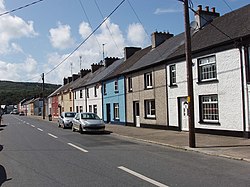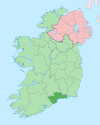Portlaw
This article has multiple issues. Please help improve it or discuss these issues on the talk page. (Learn how and when to remove these messages)
|
Portlaw
Irish: Port Lách | |
|---|---|
Town | |
 Main street of Portlaw | |
| Coordinates: 52°17′20″N 7°18′53″W / 52.288921°N 7.3146200°W | |
| Country | Ireland |
| Province | Munster |
| County | Waterford |
| Elevation | 40 m (130 ft) |
| Population (2016)[1] | |
| • Total | 1,742 |
| Time zone | UTC+0 (WET) |
| • Summer (DST) | UTC-1 (IST (WEST)) |
| Irish Grid Reference | S468154 |
Portlaw (Irish: Port Cládach or Port Lách) is a town in County Waterford, Ireland. It is also a parish in the Roman Catholic Diocese of Waterford and Lismore. It is situated some 19 km west-north-west of Waterford City, where the Clodiagh meets the Suir.
History
It was once the home of a very successful cotton mill employing most of the town's population. The mill was built by the Malcomson family. The Malcomsons were a Quaker family, and their religious ideals impacted greatly on the town, with industrial houses and social networks built as part of the planned town still forming a central part of the streetscape today. The Malcomsons were one of the most influential families connected to Irish planned industrial towns, through marriage they became connected to Quakers who designed Bessbrook in Northern Ireland, with Portlaw truss roofs being built into Bessbrook houses as a result. [citation needed]
| Year | Pop. | ±% |
|---|---|---|
| 1813 | 292 | — |
| 1821 | 395 | +35.3% |
| 1831 | 1,618 | +309.6% |
| 1841 | 3,647 | +125.4% |
| 1851 | 4,351 | +19.3% |
| 1861 | 3,852 | −11.5% |
| 1871 | 3,774 | −2.0% |
| 1881 | 1,891 | −49.9% |
| 1891 | 1,394 | −26.3% |
| 1901 | 1,101 | −21.0% |
| 1911 | 947 | −14.0% |
| 1926 | 809 | −14.6% |
| 1936 | 847 | +4.7% |
| 1946 | 1,010 | +19.2% |
| 1951 | 925 | −8.4% |
| 1956 | 1,120 | +21.1% |
| 1961 | 1,113 | −0.6% |
| 1966 | 1,154 | +3.7% |
| 1971 | 1,166 | +1.0% |
| 1981 | 1,252 | +7.4% |
| 1986 | 1,260 | +0.6% |
| 1991 | 1,151 | −8.7% |
| 1996 | 1,176 | +2.2% |
| 2002 | 1,183 | +0.6% |
| 2006 | 1,495 | +26.4% |
| 2011 | 1,696 | +13.4% |
| [2][3][4][5][6] | ||
Attractions and facilities
The town's Main Street has a bakery, butcher, grocery, bars, a Heritage Centre and Roman Catholic and Church of Ireland churches. The town's main attraction is Curraghmore House, a manor sitting on the outskirts which has around 40 ha of land, is open for visits at all times, due to the new Lord Waterford. With annual events such as the Bluebell festival, attracting visits from local families and many different parishes. Some of these events, including the Bluebell festival are in aid of various charities.
Transport
Suirway operate a bus route linking Portlaw to Waterford. Until 1963 there was a railway station at Fiddown on the Waterford to Limerick railway line which was also known as Fiddown & Portlaw. [citation needed]
See also
References
- ^ "Sapmap Area: Settlements Portlaw". Census 2016. Central Statistics Office. 2016.
- ^ Census for post 1821 figures.
- ^ Irish population infosite Archived 7 May 2016 at the Wayback Machine, histpop.org; accessed 21 September 2014.
- ^ Census information Archived 17 February 2012 at the Wayback Machine, nisranew.nisra.gov.uk; accessed 21 September 2014.
- ^ Lee, JJ (1981). "On the accuracy of the Pre-famine Irish censuses". In Goldstrom, J.M.; Clarkson, L. A. (eds.). Irish Population, Economy, and Society: Essays in Honour of the Late K. H. Connell. Oxford, England: Clarendon Press.
- ^ Mokyr, Joel; O Grada, Cormac (November 1984). "New Developments in Irish Population History, 1700-1850". The Economic History Review. 37 (4): 473–488. doi:10.1111/j.1468-0289.1984.tb00344.x. hdl:10197/1406.[dead link]


